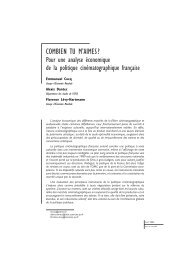N° 2005-09 Juin 2005 Guillaume Daudin* Jean-Luc Gaffard ...
N° 2005-09 Juin 2005 Guillaume Daudin* Jean-Luc Gaffard ...
N° 2005-09 Juin 2005 Guillaume Daudin* Jean-Luc Gaffard ...
You also want an ePaper? Increase the reach of your titles
YUMPU automatically turns print PDFs into web optimized ePapers that Google loves.
Offshore Outsourcing in the EU Financial Services Industrycustomer services more quickly and reliably than is possible with only internal resources.Finally, in one out of six banks, generating a momentum for change or seeking to achievegreater flexibility throughout the organisation is seen as a valid motive for outsourcing.Section 4. Risks associated with outsourcing and regulatory perspective4.1. Risks of outsourcing for European banksAlthough the benefits of outsourcing strategies are evident, in practice, many banks alsoconsider that outsourcing introduces new challenges and risks. For example, failure to choosea qualified and compatible service provider, and to structure an appropriate outsourcingrelationship, may lead to ongoing operational problems or even a severe business disruption.Most banks cite two to three different risks related to outsourcing.More specifically, almost 75 percent of the banks involved in the survey see a potentialrisk arising from the loss of control over the activities or services being outsourced, or froman undesirable dependency on the service provider (see Chart 10). The transfer of customerfinancial information to a service provider introduces the risk of potential violations ofconfidentiality, either due to security issues during the transfer itself or due to a provider’simperfect control environment. While the legal responsibility for such a violation may clearlyreside with the service provider, the banking institution would not easily be able to avoiddamage to its reputation (reputational risk).About 40 percent see operational risks. Operational risk has been defined as the risk ofmonetary losses resulting from inadequate or failed internal processes, people, and systems orexternal events. While operational risk exists whether or not a firm outsources certainbusiness activities, the transfer of managerial responsibility, but not accountability, via anoutsourcing agreement to a third-party service provider introduces new concerns.Around one-third of the banks fear that they might lose certain institutional skills/knowhowor lose the flexibility to react to changes in customer behaviour or to changes in theeconomic environment, which can be seen as strategic risks. Furthermore, 20 to 25 percent ofthe respondent banks see outsourcing risks stemming from high costs and a potential declinein the quality level of service combined with a reduction of its competitive advantage(entailing a loss of customers). Cultural and social problem (i.e., resistance by current staff,differences between the bank and the service provider in understanding and approaching thecustomer, etc.) and technical constraints (i.e., due to technical complexity) are also quoted asrelevant by several banks.42








